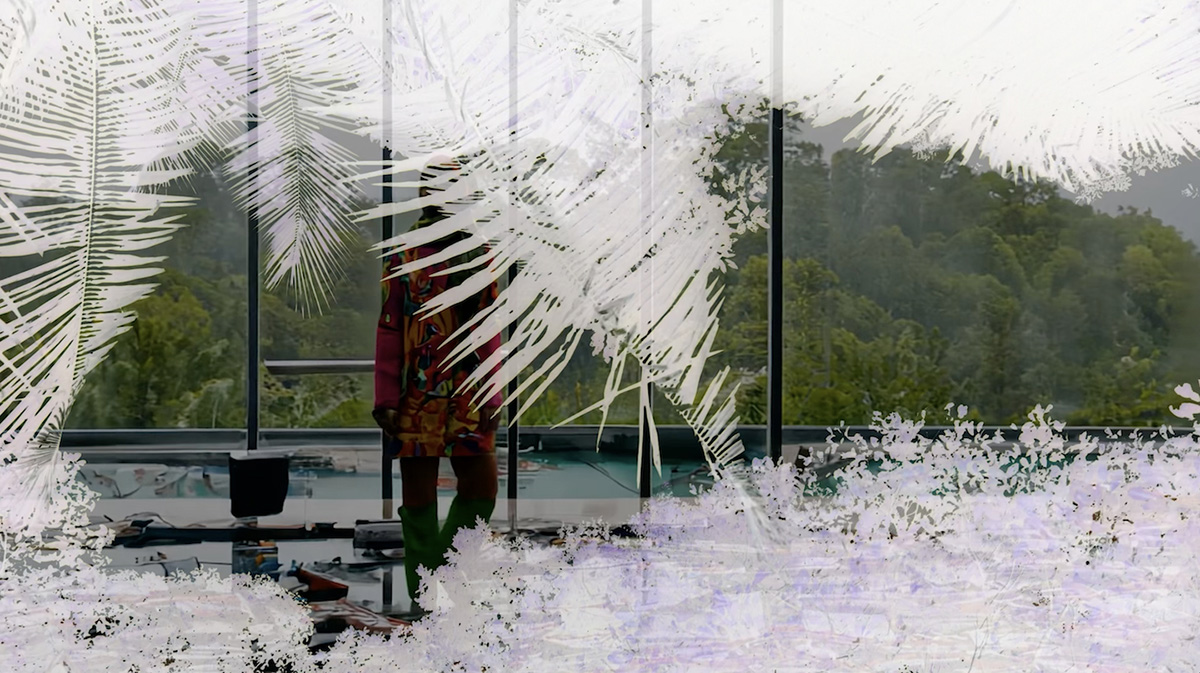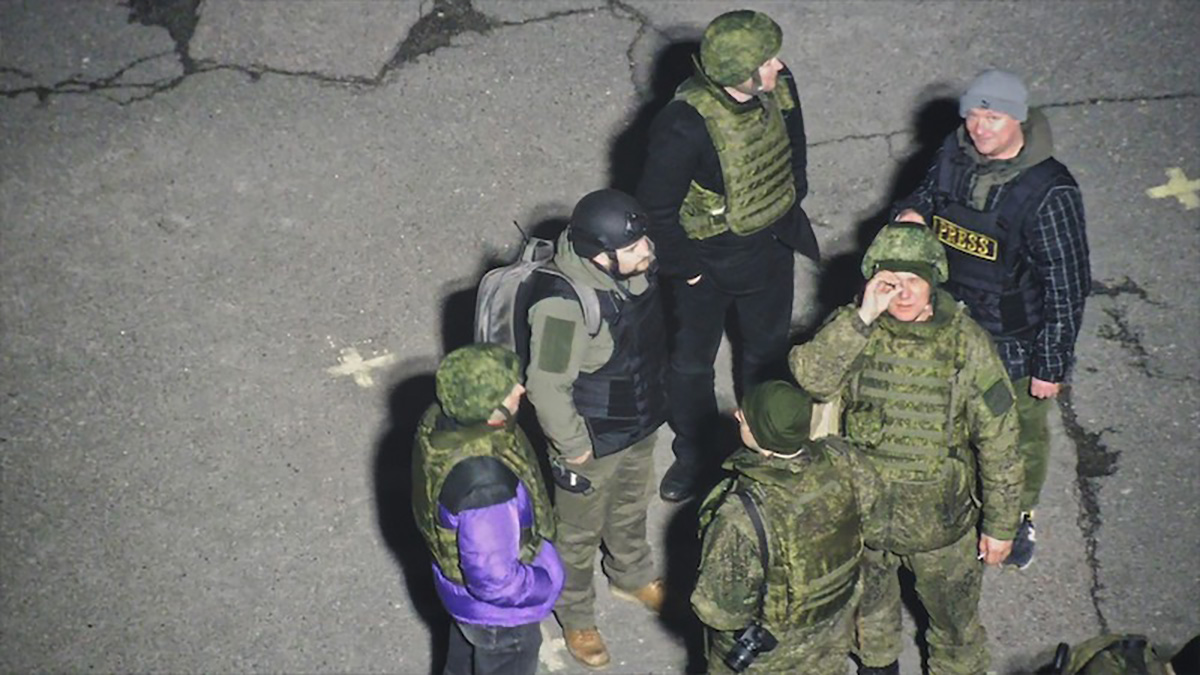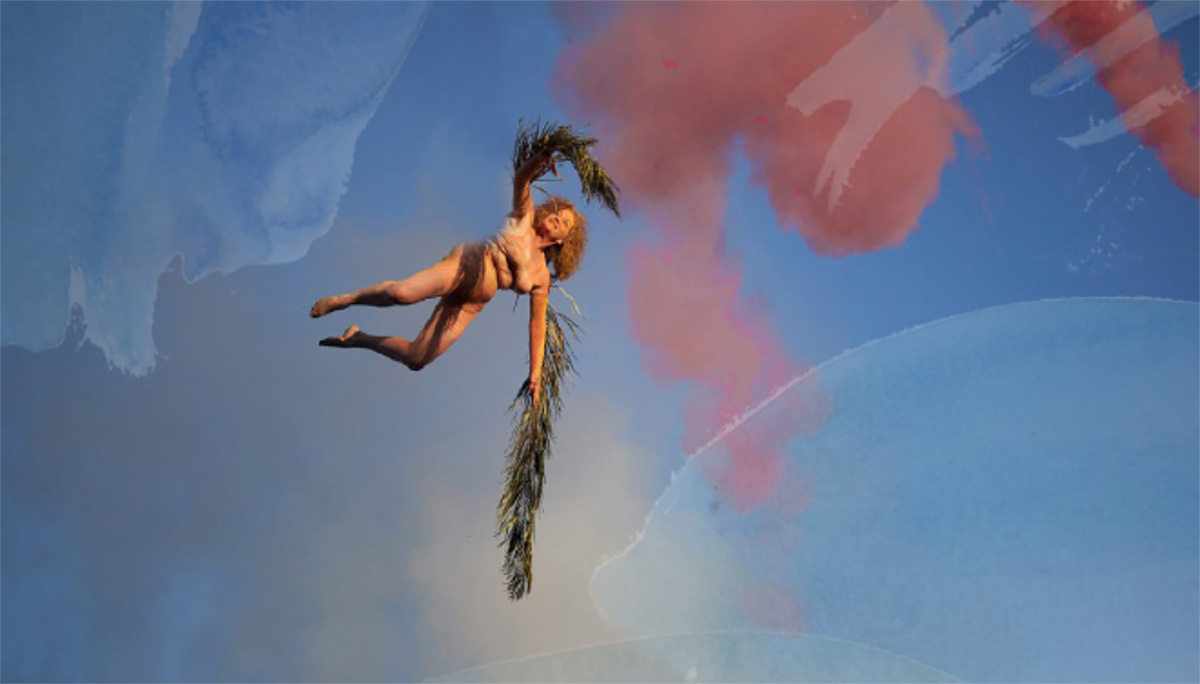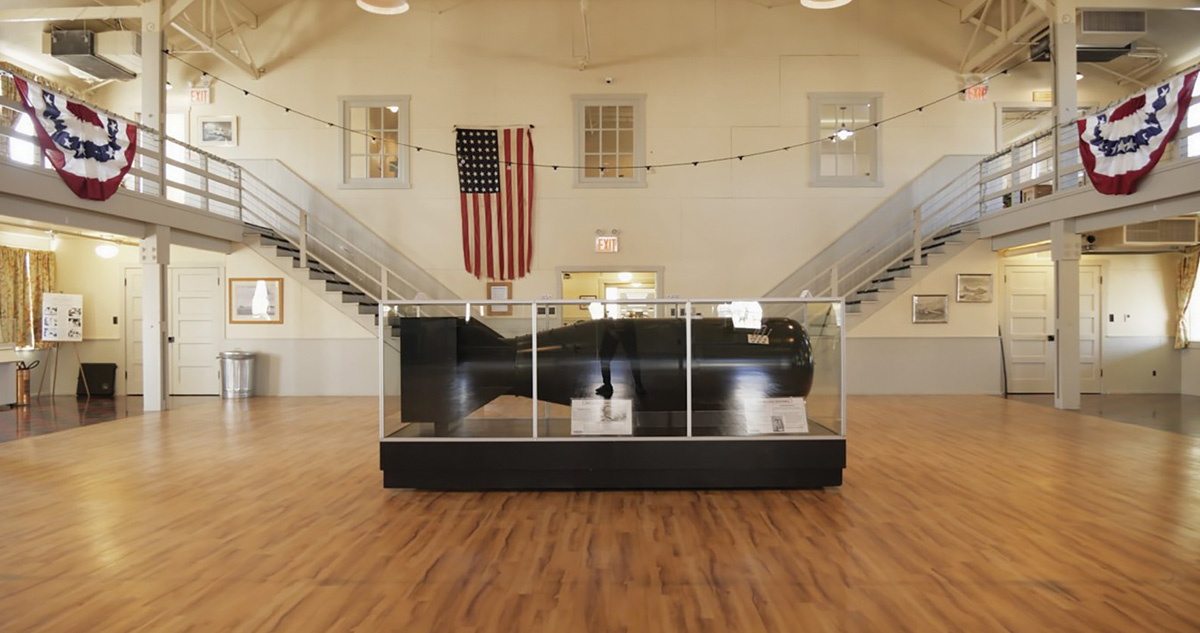Paris Programme
Thursday, 27 November 2025
Today, the Rencontres Internationales Paris/Berlin is taking place at the Jeu de Paume Cinema with four special screenings, at 2pm, 4pm, 6pm and 8pm.
Screening
Jeu de Paume | Cinéma
1 place de la Concorde, Jardin des Tuileries - 75001 Paris / Metro: Concorde, lines 1, 8 and 12 - Exit no. 1
Tickets available on site on the day of the screening, or online on the Jeu de Paume website
Professional accreditation and youth badges: free priority access subject to availability, reservation required. Reservation link coming soon.
"Like a Utopia"
Eva Giolo : Memory Is An Animal, It Barks With Many Mouths - Experimental film | 16mm | color | 24:0 | Belgium | 2025
Eva Giolo
Memory Is an Animal, It Barks with Many Mouths
Experimental film | 16mm | color | 24:0 | Belgium | 2025
Eva Giolo’s latest work takes us to Val Gardena, where people still speak Ladin, a Rhaeto-Romance language. Giolo subverts the usual representation of mountain communities to deliver a portrait of a precious cultural heritage in constant evolution. Here, the inhabitants preserve and nurture their culture for future generations with awareness of the world and creativity. Shot on 16mm film sensitive to the grandeur and fragility of nature, Memory Is an Animal, It Barks with Many Mouths is an exquisite essay on the vital importance of linguistic diversity.
Eva GIOLO (1991, Belgium) is an artist working in film, video and installation. Her work places particular focus on the female experience, employing experimental and documentary strategies to explore themes of intimacy, permanence and memory, along with the analysis of language and semiotics. Her films, installations and other projects have been widely exhibited internationally at festivals, museums and galleries, including Sadie Coles HQ, Viennale, FIDMarseille, IFFR, New York Film Festival and many others. Her film Flowers blooming in our throats (2020) was nominated for The European Film Award and awarded the Top Prize at THIS IS SHORT 2021. She also received the National Award Special Mention at Lago Film Fest 2021, the Jury Special Mention at First Crossings Festival and the Critics’s Jury Award at 25FPS Festival. She is a laureate from HISK (2018-2020) and a former art resident at SeMA NANJI (2020), the year-long film–writing residency Conversation #4 (CVB, GSARA and Beursschouwburg), CASTRO studio program (2021), WIELS (2021), RU Unlimited New York and Fogo Island Arts (2022). Her films are distributed by elephy and Light Cone.
Jean-baptiste Perret : Le Quotidien - Video | hdv | color | 5:11 | France | 2025
Jean-baptiste Perret
Le quotidien
Video | hdv | color | 5:11 | France | 2025
Filmed in the gorges of the Haut-Allier, Le quotidien is the portrait of a man who has chosen to live alone and apart, in a cabin at the edge of a forest. The images record his everyday gestures, tied to the essential needs of human existence: drinking, eating, washing, mending, beginning again. “Like an anthropologist-filmmaker, Jean-Baptiste Perret chooses a site — often rural — and immerses himself in it for long periods. He builds relationships with the people he meets there, filming their living spaces and their knowledge. Shot in the gorges of the Haut-Allier, Le quotidien portrays a man who has chosen to live alone, removed from human society, in a cabin at the forest’s edge. The videomaker captures his daily gestures, linked to the essential needs of human life: drinking, eating, washing, repairing, starting again. The film forms part of a broader enquiry into marginal life paths within rural contexts, in which other relationships to the living world, to territory, and to ecology are invented.” (Work Method, Guillaume Désanges and Coline Davenne)
After studying ecology, Jean-Baptiste Perret worked for several years in environmental protection within local authorities. A 2018 graduate of the École des Beaux-Arts de Lyon, he has continued to pursue his interest in rural contexts through a filmmaking practice that takes the form of films and video installations. His work is driven by the question of care, which he understands as an attentiveness to vulnerability, inseparable from the regenerative capacities of individuals. His approach is grounded in documentary enquiry and draws on methods borrowed from anthropology that challenge conventional criteria of objectivity, placing affect at the very centre of the research process. He is also inspired by microhistory, which seeks to step away from official narratives of the many in order to focus on individuals and their own ways of understanding the world. Jean-Baptiste Perret films people he encounters in their everyday situations, engaging with their life paths, their surroundings, and their skills. Through varying degrees of staging — always leaving room for improvisation — subjective accounts and fictional strategies intermingle. His work has been shown at the Institut d’art contemporain (IAC) in Villeurbanne as part of the 15th Lyon Biennale, at the Musée d’art contemporain de Lyon, at Fondation d’entreprise Ricard (Paris), at the Musée de la Chasse et de la Nature (Paris), at the Chapelle Saint-Jacques (Saint-Gaudens), at the Institut national d’histoire de l’art (Paris), at FID Marseille, at the Festival Hors-Pistes at the Centre Pompidou, at the États généraux du documentaire in Lussas, and more recently at the 66th Salon de Montrouge. Jean-Baptiste Perret is represented by Galerie Salle Principale in Paris.
Uriel Orlow : Forest Futures - Experimental film | 4k | color | 28:0 | Switzerland, Italy | 2024
Uriel Orlow
Forest Futures
Experimental film | 4k | color | 28:0 | Switzerland, Italy | 2024
Forest Futures is a poetic and thought-provoking film that visits ancient forest ecosystems from the earth’s past, imagines future forests in the face of changing climate and shows the forest as a multi- species school, where children practice more-than-human co-existence. Forest Futures explores the forest as a site of deep time, ecological transformation, and interspecies learning. Set in the mountainous region of South Tyrol, the film traces a journey from ancient fossilized forests that thrived over 280 million years ago through to speculative visions of future forests in a rapidly warming world. Combining scientific research with imaginative storytelling, the film reimagine the forest as both a teacher and a protagonist.
Uriel Orlow is a Swiss-born artist who lives and works between Lisbon, London and Zurich. In 2023 he was the recipient of the prestigious Prix Meret Oppenheim/ Swiss Grand Prix of Art. Orlow’s work is presented widely in international survey shows including at Dunkerque Triennale, Kochi Biennale, 12th Berlin Biennale for Contemporary Art, Kathmandu Triennale, Manifesta 12, Palermo, 2nd Yinchuan Biennial, 13th Sharjah Biennial, 7th Moscow Biennial , EVA International, Limerick, 2nd Aichi Triennale, Nagoya , Bergen Assembly, Manifesta 9, 54th Venice Biennale and elsewhere. Recent solo exhibitions include Galeria Avenida da Índia, Lisbon (2025); MCBA, Lausanne (2024); Casa da Cerca, Alamada (2022); Kunsthalle Nairs, Scuol (2021); La Loge, Brussels (2020); Kunsthalle Mainz, Germany (2020); Privas Art Centre, France (2019); Les Laboratoires d’Aubervilliers, Paris (2018); Market Photo Workshop & Pool, Johannesburg (2018); Kunsthalle St Gallen (2018) and many others. Orlow’s films been screened at Tate Modern, London; the International Short Film Festival, Oberhausen; Tank.tv; Whitechapel Gallery, London; Locarno Film Festival; Videonale Kunstmuseum Bonn; BFI London; The BBC Big Screen, Manchester; Arnolfini Bristol; Espace Croisé CAC Roubaix; and at the Biennale of the Moving Image, Geneva, and others.
Susannah Sayler, Edward Morris : The Amazon Is Elsewhere - Experimental film | 4k | color and b&w | 12:0 | USA | 2025
Susannah Sayler, Edward Morris
The Amazon is Elsewhere
Experimental film | 4k | color and b&w | 12:0 | USA | 2025
Amazon is Elsewhere is a short film that mediates on the unknowability and power of the Amazon for those who do not live within it. For many, the Amazon symbolizes “the lungs of the earth” or “nature” itself. For the indigenous people of the region, many of whom have no separate word for jungle or forest, it is simply home. The film centers around a building on the edge of the jungle: a mélange of architectural styles where trees break through the concrete floors; plants grow in the faux Corinthian columns; and jaguars made from ceramic tiles guard the entrance. AI-generated images express forces at play in both the building and the jungle that are difficult to parse as being malevolent or redemptive. The film is part of a body of work that considers how to represent the Amazon in light of its multiplicity of refracted meanings.
Susannah Sayler and Edward Morris (Sayler/Morris) work with video, photography and installation to examine our changing notions of nature, culture, and ecology. Their work is often place-based and focused on historical research. They have been awarded numerous fellowships including the Guggenheim Fellowship (2023) New York Artist Fellowship (2016), the Smithsonian Artist Research Fellowship (2014), the Center for Art and Environment Research Fellowship (2013), and the Loeb Fellowship at Harvard Graduate School of Design (2008). Their work has been exhibited broadly in the U.S. and internationally, including at the Massachusetts Museum of Contemporary Art, the Kunsthal in Rotterdam, the North Carolina Museum of Art, the Belvedere Museum, and the Southeast Center for Contemporary Art. Sayler currently teaches in the Film and Media Arts Department at Syracuse University, while Morris is Executive Director of Marble House Project. Their archives are collected by the Nevada Museum of Art / Reno, Center for Art and Environment. In 2006, Sayler/Morris co-founded The Canary Project, a studio that produces visual media and artworks that deepen public understanding of climate change. In 2021, they founded Toolshed, a platform for connecting ecological thought and action.
Benjamin Balcom : The Phalanx - Experimental doc. | 16mm | color | 13:30 | USA | 2025
Benjamin Balcom
The Phalanx
Experimental doc. | 16mm | color | 13:30 | USA | 2025
Letters from the Ceresco community trace the fragility of harmony, the dream of life in association, the frictions that give way to fracture. Members of the phalanx drift apart, lingering in private corners, suspended in speculative time.
Ben is a filmmaker and educator based in Milwaukee, Wisconsin, where he is a professor of Film, Video, Animation, and New Genres at the University of Wisconsin–Milwaukee. His most recent films explore the histories and afterlives of radical social ideals and communal living. These projects combine archival research and various modes of filmmaking to reflect on alternative ways of living. Drawing from speculative fiction, critical theory, and utopian poetics, his work often revisits the sites of now-defunct experimental schools and intentional communities, using cinema as a space for both research and imagination. Featuring landscapes both real and imagined, these films engage collective memory while speculating on futures beyond the limits of capitalism. Earlier in his practice, Balcom worked with abstraction, introspection, and formal experimentation, exploring the tensions between perception and communication, and probing the materiality of film itself. These threads continue to inform his evolving approach to nonfiction and poetic cinema. Balcom’s films have screened internationally at venues and festivals including the Museum of the Moving Image, International Film Festival Rotterdam, European Media Arts Festival, IndieLisboa, Media City Film Festival, and Ann Arbor Film Festival. He has received awards from Onion City, Athens International Film + Video Festival, and Ann Arbor. In 2023, he was a research fellow at the Center for 21st Century Studies. He also co-founded Microlights Cinema, a microcinema that ran from 2013 to 2023, dedicated to bringing experimental film and video art to audiences in Milwaukee.

Eva Giolo films the Dolomite mountains, with their unique geology and traditions, which have become inseparable from the land. In the Haut-Allier gorges, Jean-Baptiste Perret follows the daily life of a man who has chosen to live alone and apart, in a cabin on the edge of a forest. In South Tyrol, Uriel Orlow explores the forest as a place of ecological transformation and inter-species learning. Between architecture and forest, Susannah Sayler and Edward Morris film the elusive power of a place where nature, myth and artifice intertwine, revealing an Amazon that is at once a refuge, a mirage and a mirror of the world. Benjamin Balcom revisits the utopian aspirations of a 19th-century community in Wisconsin, inspired by the writings of Charles Fourier, while inviting reflection on contemporary divisions.
Screening
Jeu de Paume | Cinéma
1 place de la Concorde, Jardin des Tuileries - 75001 Paris / Metro: Concorde, lines 1, 8 and 12 - Exit no. 1
Tickets available on site on the day of the screening, or online on the Jeu de Paume website
Professional accreditation and youth badges: free priority access subject to availability, reservation required. Reservation link coming soon.
"Special Operation"
Alisa Berger : Rapture I - Visit - Experimental doc. | 4k | color | 18:22 | Germany, France | 2024
Alisa Berger
RAPTURE I - VISIT
Experimental doc. | 4k | color | 18:22 | Germany, France | 2024
RAPTURE I - VISIT piece follows Ukrainian Vogue dancer Marko as he emotionally confronts his abandoned and inaccessible apartment in Donbas, Ukraine, a region affected by ten years of war. The apartment is recreated using a 3D scan of original photographs, offering a digital reconquest of the space as Marko visits it through VR for the first time since 2018.
Alisa Berger was born 1987 in Makhachkala (Republic of Dagestan, Russia) and raised in Lviv (Ukraine) and Essen (Germany). She studied film and fine arts at the Academy of Media Art Cologne (KHM) and at the Universidad Nacional de Colombia Bogotá. With her 2017 KHM diploma film, she was nominated for the Max Ophüls Prize and for the FIRST STEPS Award of the Deutsche Filmakademie. She was also the recipient of the Best Film Award for New Directors at Int. Film Festival Uruguay and the Screenplay Award of H.W. Geißendörfer. 2018 - 2022 she lived in Tokyo and studied Butoh. Her work often deals with a search for the spiritual, non-rational drive in our world, cultures whose practices of knowledge acquisition are related to religious ideologies, mortuary cults or futuristic concepts of these beliefs.
Oleksiy Radynski : Special Operation - Documentary | mp4 | color and b&w | 65:0 | Ukraine | 2025
Oleksiy Radynski
Special Operation
Documentary | mp4 | color and b&w | 65:0 | Ukraine | 2025
The Chornobyl Zone - the site of the worst nuclear disaster in history - had been occupied by the Russian troops on February 24, 2022, in the very first hours of their all-out invasion of Ukraine. The Russians had turned the territory of the Chornobyl Nuclear Power Plant into a military base for their troops in an attempt to occupy the Ukrainian capital of Kyiv, located just a hundred miles away. They had captured the personnel of the nuclear plant who were forced to perform their duties without proper rest or sleep. The Russian plan was to stay in Chornobyl for just three days: this was their imagined time span for Ukraine’s downfall. Instead, the Russians were stuck at the radioactive site for five weeks, only to see their army collapse in the battle for Kyiv. Most of their illegal activities during these five weeks had been captured by the nuclear plant’s CCTV system, which the Russians had failed to prevent from filming. Special Operation is entirely based on these recordings. This film offers a unique perspective into the inner workings of the Russian military machine in Ukraine - and into one of its most grandiose failures. The CCTV cameras have recorded every aspect of Russian criminal presence at the contaminated Chornobyl Nuclear Power Plant - from the gross violations of nuclear safety to the staged visits by the Russian TV propagandists. We have obtained these unique materials - which had never been disclosed to the public before - from the Ukrainian law enforcement as part of our team’s long-term effort to document Russian war crimes in Chornobyl, and to help bring their perpetrators to justice. Each shot of this film is a piece of evidence representing a war crime of nuclear terror. With this film, we wish to make this evidence visible - and by doing so, to expose the profound, and frightening, incompetence of the Russian army.
Oleksiy Radynski is a filmmaker and writer based in Kyiv. His films experiment with documentary forms and practices of political cinema. They have been screened at film festivals and exhibitions worldwide including Berlinale, International Film Festival Rotterdam, Doclisboa, Thessaloniki IFF, Dokufest, the Institute of Contemporary Arts (London), e-flux (New York), Taipei Biennial, Docudays (Kyiv), Sheffield Doc Fest, Krakow IFF, DOK Leipzig etc. His films received multiple awards, including the Grand Prix at the Oberhausen International Short Film Festival for Chornobyl 22. Since the beginning of the full-scale Russian invasion of Ukraine, he has collaborated with The Reckoning Project.

Alisa Berger films Marko, a Ukrainian dancer, as he revisits – in virtual reality – the flat he had to abandon in the Donbass region, now frozen by war. Oleksiy Radynski offers a unique perspective on the inner workings of the Russian military machine in Ukraine. ‘Special Operation’ is made entirely from recordings from CCTV cameras at the Ukrainian nuclear power plant in Chernobyl during its occupation by Russian troops in February 2022, in the early hours of the invasion of Ukraine. The plant and its surroundings were then transformed into a Russian military base with the aim of reaching and occupying the Ukrainian capital, Kiev. The CCTV cameras recorded every aspect of this presence at the contaminated site of Chernobyl, from flagrant violations of nuclear safety to visits staged by Russian media propagandists.
Special screening
Jeu de Paume | Cinéma
1 place de la Concorde, Jardin des Tuileries - 75001 Paris / Metro: Concorde, lines 1, 8 and 12 - Exit no. 1
Tickets available on site on the day of the screening, or online on the Jeu de Paume website
Professional accreditation and youth badges: free priority access subject to availability, reservation required. Reservation link coming soon.
Carte blanche to Laure Prouvost
Laure Prouvost will present her work, her current projects and research, with the screening of excerpts and documents, in dialogue with curator Anne-Sophie Dinant.

Special screening
Jeu de Paume | Cinéma
1 place de la Concorde, Jardin des Tuileries - 75001 Paris / Metro: Concorde, lines 1, 8 and 12 - Exit no. 1
Tickets available on site on the day of the screening, or online on the Jeu de Paume website
Professional accreditation and youth badges: free priority access subject to availability, reservation required. Reservation link coming soon.
"The Toxic Fields of Abundance"
Lukas Marxt, Vanja Smiljanic : Among The Palms The Bomb Or: Looking For Reflections In The Toxic Field Of Plenty - Experimental doc. | mov | color | 85:0 | Austria, Germany | 2024
Lukas Marxt, Vanja Smiljanic
AMONG THE PALMS THE BOMB or: Looking for reflections in the toxic field of plenty
Experimental doc. | mov | color | 85:0 | Austria, Germany | 2024
The Salton Sea in southern California is a unique ecosystem. In just four years, the water level has fallen by a good half a meter, and with a maximum depth of ten meters you can calculate when it is expected to dry out. And that’s just the global aspect, which has to do with global warming and changes in the local climate. The Salton Sea is also special because the United States tested numerous atomic bombs here in the final phases of World War II and the Cold War – initially in preparation for the Hiroshima and Nagasaki bombings, later as training for missions that fortunately never took place. In AMONG THE PALMS THE BOMB, Lukas Marxt and Vanja Smiljani? are particularly interested in this aspect of regional history. The film begins in Utah, where the planes took off and then found their destination in the supposedly secluded area around the Salton Sea. There is a museum in Wendover where you can also see models of “Fat Man” and “Little Boy”, the only two atomic bombs ever used in war, along with a loading pit where the planes were loaded, to which Marxt dedicated a shorter film in 2019. For many years he has been dealing with the situation in southern California, which can be described as extreme in many respects. Intensive agriculture, which relies radically on monocultures, has cast a spell over everything there. Marxt and Smiljani? find out that an alliance has been formed against this backdrop: illegal harvest workers from Latin America seek refuge in Native American reservations. AMONG THE PALMS THE BOMB has local experts explain the landscape and history, and the director is looking for dissenting voices, especially among the tribe of the Torres Martinez Desert Cahuilla Indians, who were victims of genocide in the 19th century. Their survivors now recall how many plants that had healing powers and were part of a life with nature once grew around the salty water of the Salton Sea. Now the area belongs to the salt bushes, and beneath the surface ticks the uranium of a Cold War that is about to return. Scary times, someone says. (Bert Rebhandl)
Lukas Marxt (*1983, Austria) is an artist and a filmmaker living and working between Cologne and Graz. Marxt´s interest in the dialogue between human and geological existence, and the impact of man upon nature was first explored in his studies of Geography and Environmental Science at the University of Graz, and was further developed through his audio visual studies at the Art University in Linz. He received his MFA from the Academy of Media Arts Cologne, and attended the postgraduate programme at the Academy of Fine Arts Leipzig. Marxt has been sharing his research in the visual art environment as well as in the cinema context. His works have been featured in numerous solo and group exhibitions, most recently at the Torrance Art Museum (Los Angeles, 2018), at The Biennial of Painting, Museum Dhondt-Dhaenens (Belgium, 2018), and at the Museum of Modern and Contemporary Art Rijeka (Croatia, 2018). His films have been presented in numerous International Film Festivals including Berlinale (Germany, 2017 and 2018), Curtas Vila do Conde (Portugal, 2018), and the Gijón International Film Festival where he receiced the Principado de Asturias prize for the best short film (Spain, 2018). Since 2017, Marxt has spent a considerable amount of time in Southern California, where he has researched the ecological and socio-political structures surrounding the Salton Sea. Vanja Smiljani? (Belgrade, 1986) is a visual and performance artist living and working between Lisbon and Cologne. She concluded the post-master in Artistic research at A.pass, Brussels (2015), MFA at the Dutch Art Institute (DAI), Arnhem (2012), and Kunsthochschule für Medien Köln (2019) and got a degree in Fine Arts at the Faculdade de Belas Artes de Lisboa (2009). In her practice she often utilizes the model of performance-lecture as a way to bridge fictitious and experiential universes, comprising technical apparatus, diagrams and sci-fi povera sculptures. Connecting otherwise unparalleled reality systems, Vanja's work attests the foundation of ideologies as alienated regimes, recurring to her own body as a vessel for narration, often shifting between the position of oracle and storyteller.

Lukas Marxt and Vanja Smiljanić explore the Salton Sea – California's largest lake, in a state of ecological collapse – and film the surrounding community struggling to survive in this dystopian reality. The film intertwines the narratives of the power that shaped history with those of tribal communities whose history has been erased over time – between memories of the genocide of Native American tribes, the Manhattan Project's military atomic bomb tests in the 1940s, and intensive agriculture that is killing wildlife.